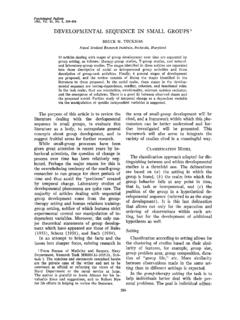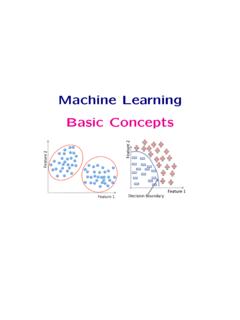Transcription of Self-Efficacy, Motivation, and Performance
1 self - efficacy , motivation , and Performance By: Dale H. Schunk Schunk, D. H. (1995). self - efficacy , motivation , and Performance . Journal of Applied Sport Psychology, 7(2), 112-137. Made available courtesy of Taylor and Francis: **Reprinted with permission. No further reproduction is authorized without written permission from Taylor and Francis. This version of the document is not the version of record. Figures and/or pictures may be missing from this format of the document.** Abstract: This article discusses the relation of self - efficacy to motivation and Performance in cognitive and sport domains, self - efficacy refers to one's beliefs about accomplishing a task and can influence choice of activities, effort, persistence, and achievement. People enter activities with varying levels of self - efficacy derived fund prior experience, personal qualities, and social support.
2 As they work on tasks they acquire information about how well they are doing. This information influences their self - efficacy for continued learning and Performance . Research is described in which interventions involving models, goal setting, and feedback, were employed to affect self - efficacy . Regardless of domain, research shows that self - efficacy helps to predict motivation and Performance , and studies testing causal models highlight the important role played by self - efficacy . Suggestions for future research are given, along with implications of theory and research for education and training. Article: The role of self - efficacy in motivation and Performance has been increasingly explored since Bandura's (1977a, 1977b) original publications. self - efficacy refers to, "People's judgments of their capabilities to organize and execute courses of action required to attain designated types of performances" (Bandura, 1986, p.)
3 391). Stated differently, we might say that self - efficacy involves one's beliefs about accomplishing a task. Research shows that self - efficacy predicts such outcomes as cognitive skill learning, smoking cessation, pain tolerance, athletic Performance , career choices, assertiveness, coping with feared events, recovery from heart attack, and sales Performance (Bandura, 1986; Maddux, 1993; Schunk, 1989). This article focuses on the relation of self - efficacy to motivation and Performance in the cognitive and sport domains. Initially I present an overview of self - efficacy theory to include causes and consequences of self - efficacy . I then discuss research on three types of interventions de-signed to affect self - efficacy : models, goal setting, feedback. Some evidence is provided on the utility of self - efficacy as a predictor of behavior. The article concludes with future research directions and implications of research findings for education and training.
4 self - efficacy Theory Bandura (1977a) hypothesized that self - efficacy affects choice of activities, effort, persistence, and achievement. Compared with persons who doubt their capabilities, those with high self - efficacy for accomplishing a task participate more readily, work harder, persist longer when they en-counter difficulties, and achieve at a higher level. People acquire information to appraise self - efficacy from their performances, vicarious (observational) experiences, forms of persuasion, and physiological reactions. One's performances offer reliable guides for assessing self - efficacy . Successes raise efficacy and failures lower it, but once a strong sense of efficacy is developed a failure may not have much impact (Bandura, 1986). People also acquire self - efficacy information from knowledge of others through social comparisons. Those who observe similar peers perform a task are apt to believe that they, too, are capable of accomplishing it.
5 To remain credible, however, information acquired vicariously requires validation by actual Performance . We often receive persuasive information from others that we are capable of performing a task ( , "You can do this"). Such positive feedback can enhance self - efficacy , but this increase will be temporary if subsequent efforts turn out poorly. Individuals also acquire efficacy in-formation from physiological reactions ( , heart rate, sweating). Symptoms signaling anxiety might be interpreted to mean one lacks skills. self - efficacy is not the only influence on behavior. High self - efficacy will not produce a competent Performance when requisite knowledge and skill are lacking. In this instance, a sense of self - efficacy for learning is beneficial because it motivates individuals to improve their competence, Outcome expectations, or beliefs concerning the probable outcomes of actions, are important because people strive for positive outcomes.
6 Out-come expectations and self - efficacy often are related. Efficacious learners expect and usually receive positive outcomes for their actions. There is, however, no automatic relation between the two. Students may expect positive outcomes as a result of performing well on a test or at a track meet but may doubt their capabilities of attaining a high level of Performance . This point is important because self - efficacy and outcome expectancies occasionally are confused in the literature. Finally, value of outcomes, or how much individuals desire certain outcomes relative to others, affects behavior because people are motivated to act in ways they believe will result in outcomes that are self -satisfying. The role of self - efficacy in behavioral change is highlighted in the model shown in Figure 1. At the start of an activity, individuals differ in their self - efficacy for learning or performing actions as a function of their prior experience at the same or similar activities and such personal qualities as abilities and attitudes.
7 Initial self - efficacy also is affected by the type of support persons receive from significant individuals in their environment. Students differ, for example, in the extent that parents and teachers encourage them to develop skills, facilitate their access to resources necessary for learning ( , materials, facilities), and teach them self -regulatory strategies that enhance skill acquisition and refinement (Ericsson, Krampe, & Tesch-Romer, 1993). As people engage in activities, they are affected by such personal influences as goal setting and information processing, along with situational factors ( , rewards, teacher feedback). From these factors people derive cues signaling how well they are performing. motivation and self - efficacy are enhanced when people perceive they are performing skillfully or becoming more competent. Lack of success or slow progress will not necessarily lower self - efficacy and motivation if individuals believe they can perform better by adjusting their approach ( , expend more effort, use effective task strategies) (Schunk, 1989).
8 Interventions Designed to Affect self - efficacy In this section I summarize some research on three types of interventions designed to influence self - efficacy : models, goal setting, feedback. What follows is neither exhaustive nor comprehensive. These factors were selected because they are relevant to cognitive and sport domains. Space constraints prevent my discussing relevant research in other domains ( , health) or other potentially important factors (rewards, social comparisons). Interested readers may wish to consult other sources (Bandura, 1986, in press; Maddux, 1993; Maddux, Brawley, & Boykin, in press; Schunk, 1989; Strecher, DeVellis, Becker, & Rosenstock, 1986). Models Models provide an important vicarious source of self - efficacy information (Bandura, 1986). Observing competent models successfully per-form actions conveys information to observers about the sequence of actions one should use to succeed.
9 Modeled displays convey that observers are capable of learning or accomplishing the task if they follow the same sequence of actions. The belief that one knows what to do to perform a task raises self - efficacy , and this vicarious increase can motivate observers to perform the task (Schunk, 1989). Research shows that models can have profound effects on self - efficacy , motivation , and achievement. In the context of a long-division instructional program, Schunk (1981) provided low-achieving children with either cognitive modeling or didactic instruction. For the cognitive modeling, children observed an adult model explain division operations and apply them to sample problems. Following this modeled exposure, children received guided practice as they solved problems and received corrective instruction from the models as necessary. Children then solved problems alone during independent practice.
10 In the didactic condition, children reviewed instructional material that explained and exemplified division operations, after which they received guided and independent practice. Before and after instruction children's division skill, persistence, and self - efficacy for solving different types of division problems were assessed. Cognitive modeling and didactic instruction raised self - efficacy equally well; however, modeling led to greater gains in division skill and to more accurate perceptions of capabilities as these children's efficacy judgments corresponded more closely to their actual performances. Didactic subjects tended to overestimate what could do. Regardless of treatment condition, self - efficacy related positively to persistence and achievement. As will be discussed later, path analysis showed that self - efficacy mediated the relation between instructional treatment and division Performance .





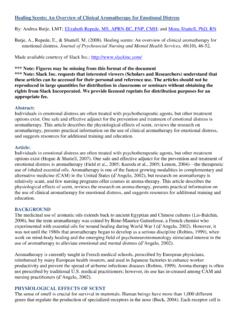

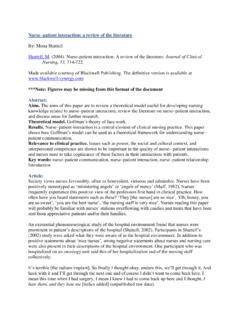


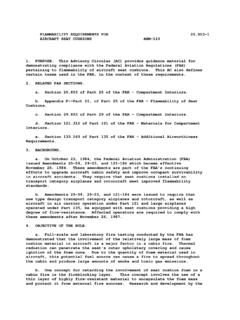
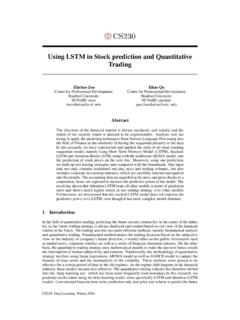



![arXiv:1411.1784v1 [cs.LG] 6 Nov 2014](/cache/preview/f/a/6/8/3/a/5/7/thumb-fa683a5739b507f70aa173f9c218eee1.jpg)
